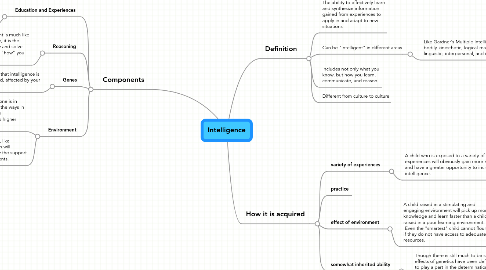
1. Components
1.1. Education and Experiences
1.1.1. Like Cattell's crystallized intelligence, your education and experiences give you skills, information, and expertise. It is "what" you know.
1.2. Reasoning
1.2.1. The reasoning component is much like Cattell's fluid intelligence, it is the capacity to think logically and solve problems resonably. It is "how" you know.
1.3. Genes
1.3.1. It has been shown that intelligence is somewhat inherited, affected by your genes.
1.4. Environment
1.4.1. The environment in which one is in affects their behaviors and the ways in which one adapts. Positive environments could lead to higher intelligences.
1.4.2. There is also a component of the environment, like Distributed Intelligence, that says that a person will behave more intelligently when surrounded by the support of their physical, social, and cultural environments.
2. Definition
2.1. The ability to effectively learn and synthesize information gained from experiences to apply in and adapt to new situations
2.2. Can be "intelligent" in different areas
2.2.1. Like Gardner's Multiple Intelligences Theory: musical, bodily-kinesthetic, logical-mathematical, spatial, linguistic, interpersonal, and intrapersonal
2.3. Includes not only what you know, but how you learn, communicate, and reason.
2.4. Different from culture to culture
3. How it is acquired
3.1. variety of experiences
3.1.1. A child who is exposed to a variety of experiences will obviously gain more knowledge and have a greater opportunity to increase their intelligence.
3.2. practice
3.3. effect of environment
3.3.1. A child raised in a stimulating and engaging environment will pick up more knowledge and learn faster than a child raised in a poor learning environment. Even the "smartest" child cannot flourish if they do not have access to adequate resources.
3.3.1.1. e.g. - Studies on the effects of a child's nutrition has shown that malnutrition may lead to lower IQ scores and long term impact on cognitive development
3.4. somewhat inherited ability
3.4.1. Though there is still much to be studied, the effects of genetics have been definitively shown to play a part in the determination of a child's IQ.
